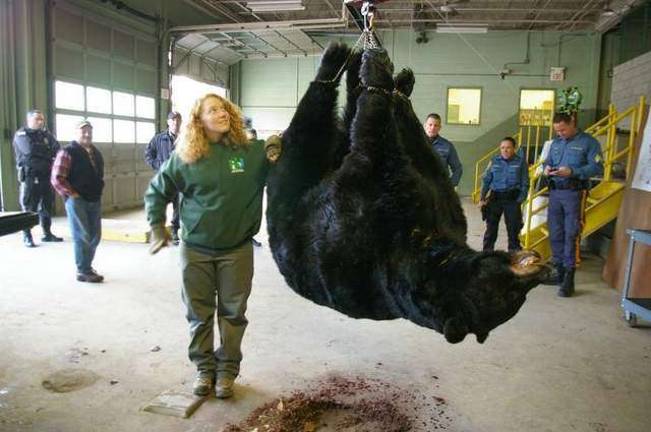Annual hunt takes toll on NJ bear population

After bouncing back from the verge of extinction in the 1970s, New Jersey’s black bear population is once again on the decline thanks to three consecutive state-sanctioned hunts. New Jersey hunters killed 287 bears in December’s six-day hunt – most of them in Sussex County. That’s less than half the number of bears that were killed in 2010, highlighting the fact that there are fewer bears in “bear country” than there were three years ago.
The state held bear hunts in 2003 and 2005, but not until 2010 did the bear hunt become a yearly tradition. The controversial hunts – which allow hunters to attract bears with bait – are intended to thin the bear population, and they’ve done just that. Northern New Jersey’s black bear population was estimated before the most recent hunt at between 2,800 and 3,000. That’s down from 3,400 in 2010, according to the New Jersey Department of Environmental Protection. There have been far fewer bear-human encounters in the 1,000-square-mile area north of I-78 and west of I-297 where most of these bears live, but the number of reports of bears in the central and southern parts of the state is growing. No one has been killed by a black bear in the state since 1852.
The hunting is over for the season, but – unless the bear activists have more success than in recent years – it’s far from finished. The state’s five-year bear “management” program calls for a bear hunt every year until 2015. “We are working to stabilize and reduce the state’s black bear population, to eventually be maintained at a density that minimizes human/bear conflicts, provides for a sustainable population within suitable bear habitat, and minimizes movement of bears to unsuitable habitat in suburban and urban areas,” said Dave Chanda, director of DEP’s Division of Fish and Wildlife, in a press release.
Interestingly, the number of bear hunters was down this year, too. About 7,000 hunters participated in this winter’s hunt, which is about 500 fewer than last year, estimated DEP spokesman Lawrence Ragonese. It could’ve been the strange weather the week of the bear hunt, said Ragonese, or it could have been that hunters who had already gotten their bear last year or the year before weren’t interested in doing it again.